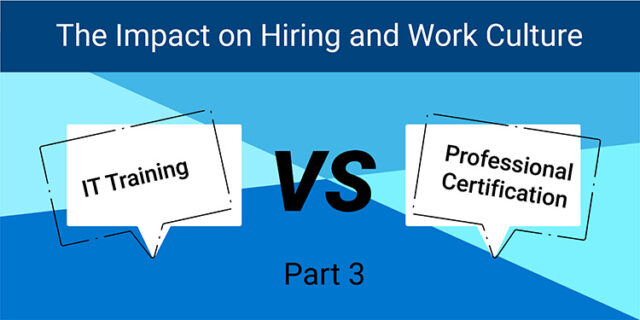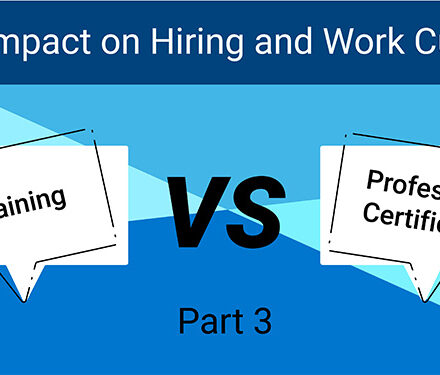In Part 1 and Part 2 of this series, we explained how professional IT certification improves one’s knowledge and performance and provides specific benefits to one’s company. This final part of the series discusses the benefits acquired in the hiring and employment cultures of companies that maximize IT certification.
Benefits of IT Certification: Hiring and Work Culture
Certification boosts confidence in the company by employees. Employees, yourself included, appreciate and respect companies that seek to hire quality by choosing certified candidates. The employer that provides you the opportunity to increase knowledge, improve performance, and become a more valuable professional also strengthens your confidence in the company. There is a direct ratio between confidence in the company and job performance. IT individuals also feel pride when their employer promotes leading-edge skills and knowledge by means of certification programs. Extensive evidence suggests that individuals who feel pride in where they work and who they work for engage more productively in their assignments.
Certification attracts quality job candidates. Certification attracts candidates best qualified for the positions available. As in any field, quality IT candidates gravitate to companies that offer training and development opportunities. Companies that encourage employees to learn, to grow, and to expand their skills and abilities inevitably earn high marks from existing and potential employees. Opportunities such as professional certification can make an employer more attractive than its competitors.1
Certification produces more employment opportunities. As early as 2011, the US Bureau of Labor Statistics, discussing a variety of IT jobs, offered this:
Jobseekers can enhance their employment opportunities by earning certifications, which are offered through product vendors, computer associations, and other training institutions. Many employers regard these certifications as the industry standard, and some require their employees to be certified. In some cases, applicants without formal education may use certification and experience to qualify for some positions. 2
Scott Skinger, founder of TrainSignal.com and leader in IT training, cited a CompTIA survey reporting that 64% of IT hiring managers valued certified professionals as the candidates with a “high or very-high degree of expertise.” In the same article, Network World’s report maintained that 60% of IT professionals surveyed said “certification led directly to a new job.”3
As recently as April 2020, the Bureau of Labor Statistics reported:
Employment of computer and information technology occupations is projected to grow 12 percent from 2018 to 2028, much faster than the average for all occupations. These occupations are projected to add about 546,200 new jobs. Demand for these workers will stem from greater emphasis on cloud computing, the collection and storage of big data, and information security. 4
The benefits of certification continue to evolve over time with the technological advances of IT and the learning landscape. The number of jobs and their complexity will impact employers’ skill needs through the coming decade.
Tying It Together
Certification validates that you have committed time, energy and motivation to fulfill a goal. We’ve seen that certification is beneficial to individuals and businesses alike. Through your certification, hiring managers gain confidence that you possess a personal dedication to learning and applying your knowledge. At the same time, your company’s commitment to certification gives you and other job candidates confidence that it is a right place to work, a desired quality for any IT professional.
Dell Technologies’ Proven Professional certification series contributes to IT departments’ hiring practices and their strong professional work cultures.
Sources
- “How to Build an Employer Brand that Attracts & Retains Talent.” Digital Marketing Institute.
- Andrew, Peter. “Computer Training vs certification: What’s the difference?” Computer Training Schools.
- Skinger, Scott. “IT Certifications vs Experience vs Degree.” IT Career Finder. 2011
- US Bureau of Labor Statistics: Occupational Outlook Handbook, Computer and Technology Occupations, April 2020


